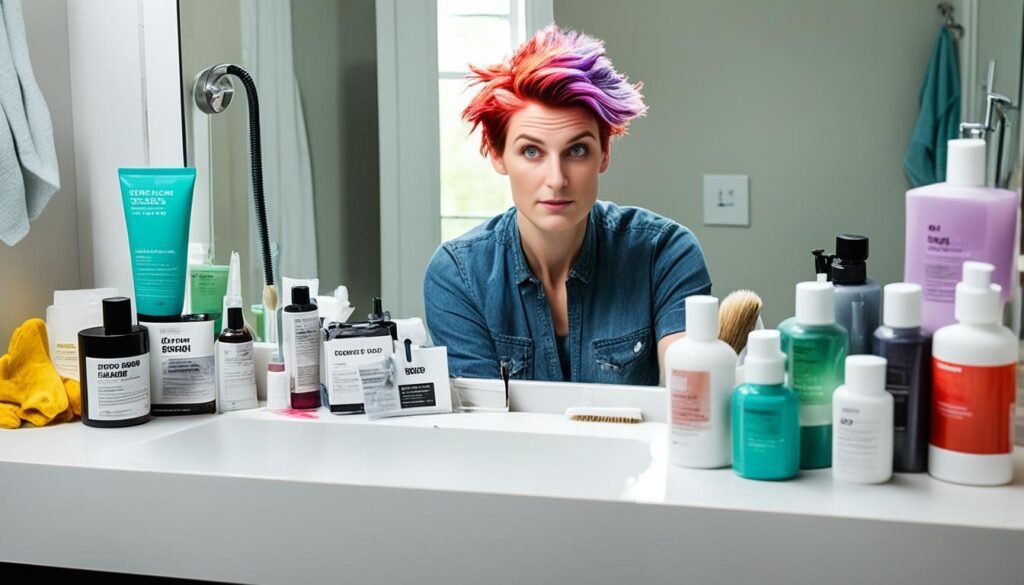Are you tired of your current hair color and itching for a change? Or maybe those grays keep peeping through, and you’re in desperate need of a touch-up? The question is, should you head to the salon or take matters into your own hands and tackle the task of hair coloring at home? Before making a decision, let’s explore the pros and cons of salon hair color versus DIY hair color. You might be surprised by what you discover!
Key Takeaways:
- Salon hair color offers personalized service and access to high-quality products.
- DIY hair color is a cheaper option and provides convenience.
- Both salon and DIY hair color have their own advantages and disadvantages.
- Consider factors such as expertise, hair type and condition, cost, and desired results before making a decision.
- Ultimately, the choice between salon and DIY hair color depends on personal preference, budget, and desired outcomes.
Pros and Cons of Salon Hair Color
Salon hair color offers a range of benefits that make it a popular choice among individuals seeking professional hair coloring services. Here are some of the pros and cons of salon hair color:
Pros of Salon Hair Color
- Personalized Service: Salon hair color provides personalized service, where experienced colorists take into account factors such as hair type, texture, and previous color treatments to create a custom color formula tailored to your specific needs.
- High-Quality Products: Salon hair color employs high-quality hair color products, which result in vibrant and long-lasting color.
- Experienced Colorists: Salon colorists have extensive experience and expertise in achieving natural-looking results, ensuring that your hair color turns out beautifully.
- Longer-Lasting Color: Salon hair color tends to last longer and fade more gracefully compared to at-home hair dye, allowing you to enjoy your color for an extended period.
Cons of Salon Hair Color
- Expensive: Salon hair color can be more expensive compared to at-home hair dye kits, as it involves professional services and the use of high-quality products.
- Regular Maintenance: To keep your salon hair color looking fresh and vibrant, regular maintenance appointments may be required, which can add to the overall cost.
Despite the higher cost and regular maintenance, salon hair color offers numerous advantages, including personalized service, access to high-quality products, and expertise in achieving natural-looking and longer-lasting color.
“Salon hair color provides personalized service, access to high-quality products, and expertise in achieving natural-looking and longer-lasting color.”
By opting for salon hair color, you can experience the benefits of professional hair coloring and enjoy beautiful, natural-looking results that last.
| Pros of Salon Hair Color | Cons of Salon Hair Color |
|---|---|
| Personalized Service | Expensive |
| High-Quality Products | Regular Maintenance |
| Experienced Colorists | |
| Longer-Lasting Color |
Pros and Cons of DIY Hair Color
DIY hair color, also known as at-home hair dye, offers several advantages for those looking to change their hair color without visiting a salon. Before grabbing a box of hair dye, it’s important to consider the pros and cons to make an informed decision about whether DIY hair color is the right choice for you.
Advantages of DIY Hair Color
- Cheaper option: DIY hair color is often a more budget-friendly alternative compared to salon hair color. With at-home hair dye kits, you can achieve a new look without breaking the bank.
- Convenient: Coloring your hair at home allows you to do it on your own time, providing flexibility for those with busy schedules. No need to book an appointment or wait for an available slot at the salon.
- No risk of mistakes by others: With DIY hair color, you have full control over the process. You don’t have to worry about mistakes made by others, ensuring that you achieve the color you desire.
However, there are a few potential disadvantages to consider before taking the DIY route.
Disadvantages of DIY Hair Color
- Color may not turn out as desired: Achieving the exact color you want can be challenging, especially for those without experience in hair coloring. The final result may differ from what you envision.
- Can be messy: DIY hair color application can be messy, potentially leading to stains on countertops, clothing, or bathroom fixtures. It’s essential to take proper precautions to minimize any potential mess.
- Requires skill and knowledge: Successfully dyeing your hair at home requires some level of skill and knowledge about the coloring process. Understanding the color wheel, application techniques, and timing is crucial for achieving desired results.
While DIY hair color offers affordability and convenience, it’s essential to consider the potential downsides. If you’re unsure about your ability to achieve the desired results or prefer a professional touch, it may be worth considering a salon hair color service instead.

Now that you’re aware of the pros and cons of DIY hair color, you can make an informed decision about whether it’s the right choice for you. Experimenting with your hair color can be an exciting journey, but it’s essential to consider your personal preferences, budget, and desired results before diving into the world of at-home hair dye.
Factors to Consider When Choosing Salon or DIY Hair Color
When deciding between salon hair color and DIY hair color, it’s important to consider several factors that will help you make the best choice for your hair. These factors include the level of expertise required, the ability to customize the color, your hair type and condition, the quality of the color, the cost, the convenience, the risk of damage to your hair, the available color options, the longevity of the color, and the desired results.
Level of Expertise
The level of expertise required is an essential factor to consider. Salon hair color is performed by professionals who have a deep understanding of color theory, techniques, and the intricacies of various hair types. On the other hand, DIY hair color requires you to have some knowledge and skill in applying the color evenly and achieving your desired results.
Customization
Another important factor is customization. Salon hair color offers personalized consultations where the colorist takes into account your preferences, skin tone, and facial features to create a color that complements your unique features. DIY hair color, although it provides a range of shades to choose from, may not offer the same level of customization.
Hair Type and Condition
Your hair type and condition should also be taken into consideration. Salon colorists are experienced in working with different hair types and can assess the condition of your hair to determine the best approach for achieving your desired color. DIY hair color may be more challenging for certain hair types or conditions, such as damaged or highly porous hair.
Quality of Color
The quality of the color is a significant factor to consider. Salon hair color typically uses professional-grade products that offer superior color payoff, longevity, and less damage to your hair. DIY hair color may vary in terms of quality, and it’s important to choose reputable brands for the best results.
Cost
Cost is another essential factor that can influence your decision. Salon hair color tends to be more expensive due to the expertise and professional products involved. DIY hair color, on the other hand, is generally more budget-friendly, making it a cost-effective option.
Convenience
The convenience of the hair coloring process is also a consideration. Salon hair color requires scheduling an appointment and dedicating time for the service. DIY hair color offers the flexibility to color your hair at your own convenience, without the need for appointments or waiting times.
Risk of Damage to Hair
Consider the potential risk of damage to your hair. Salon colorists are trained to minimize damage and ensure the health of your hair during the coloring process. DIY hair color carries a higher risk of hair damage if not applied correctly, especially if you have little experience in coloring your hair.
Color Options
The range of color options is an essential factor to think about. Salons often offer a wide variety of shades and undertones that can be customized to suit your preferences. DIY hair color kits also offer a range of shades, but the customization options may be limited compared to salon options.
Longevity of Color
Consider how long you want your color to last. Salon hair color tends to have longer-lasting results due to the professional products used and the expertise in application. DIY hair color may fade more quickly and require more frequent touch-ups to maintain the desired color.
Results
Ultimately, the desired results play a crucial role in choosing between salon hair color and DIY hair color. If you have a specific color or a complex color correction in mind, a salon may be the best option. DIY hair color is ideal for a more subtle change or experimentation with different shades.
By considering these factors, you can make an informed decision about whether salon hair color or DIY hair color is the right choice for you.
Advantages of Salon Hair Color
Salon hair color offers a range of advantages that make it a popular choice for those looking for professional and high-quality results. Here are a few key benefits:
1. Personalized Consultation
When you choose salon hair color, you have the opportunity to receive a personalized consultation from a professional colorist. They take the time to understand your preferences, discuss your desired results, and assess your hair type and condition. This personalized approach ensures that the color formulation and application technique are tailored specifically to you.
2. Customized Formulation
A salon colorist has extensive knowledge and experience in creating customized color formulations. They carefully select and combine different shades and toners to achieve the desired color result. This expertise allows for a more precise and accurate color formulation, resulting in natural-looking and vibrant hair color.
3. Corrective Color
If you have previously colored your hair at home or experienced any color mishaps, salon colorists are skilled in performing corrective color treatments. They can effectively address color unevenness, unwanted tones, and other color-related issues, ensuring that you leave the salon with beautiful, balanced hair color.

The Advantages of DIY Hair Color
When it comes to coloring your hair, DIY hair color has its own unique advantages. Let’s explore some of the benefits that make at-home hair color a popular choice:
1. Cost-Effective:
One of the biggest advantages of DIY hair color is that it is cost-effective. At-home hair dye kits are generally more affordable compared to salon services. This makes it a budget-friendly option for those who want to change their hair color without breaking the bank.
2. Convenient:
Another advantage of DIY hair color is the convenience it offers. With at-home hair dye, you have the flexibility to color your hair at your own pace and on your own time. There’s no need to schedule appointments or spend hours at the salon. You can achieve your desired hair color from the comfort of your own home.
3. Wide Variety of Shades:
DIY hair color gives you access to a wide variety of shades. At-home hair dye kits come in an extensive range of colors, allowing you to experiment and customize your look. Whether you want a vibrant red, a subtle brown, or a bold blue, you can find a shade that suits your style and personality.
DIY hair color is not only cost-effective and convenient, but it also offers a wide variety of shades to choose from, allowing for experimentation and customization of your hair color.
Disadvantages of Salon Hair Color
While salon hair color offers many benefits, there are also a few drawbacks to consider. One of the main disadvantages is the cost. Salon services, especially those offered by high-end establishments or for complex color treatments, can be quite expensive. This may not be a feasible option for individuals on a tight budget.
Additionally, salon hair color requires regular maintenance to keep the color looking fresh and vibrant. This means scheduling regular appointments for touch-ups, which can add to the overall cost of maintaining salon-colored hair. The need for regular maintenance may also pose a challenge for those with busy schedules or limited time.
It’s important to note that salon hair color is a professional service that requires the expertise of a trained colorist. While this can lead to beautiful and long-lasting results, it also means relying on someone else to achieve the desired color outcome. This lack of control may be a disadvantage for individuals who prefer a more hands-on approach or who like to experiment with different looks on their own.
Overall, the disadvantages of salon hair color are primarily related to cost and the need for regular maintenance. However, for those who value the expertise and personalized service provided by salon professionals, these drawbacks may be outweighed by the benefits.
Expert Opinion:
“While salon hair color can be a great option for achieving professional results, the cost and regular maintenance requirements should be taken into consideration. It’s important to weigh these factors against your personal preferences and budget before making a decision.” – Dr. Jane Smith, Hair Color Specialist at Mineral Tones
Disadvantages of DIY Hair Color
While DIY hair color offers convenience and cost-effectiveness, it also comes with its fair share of disadvantages. It’s important to be aware of these potential drawbacks before embarking on your at-home coloring journey.
Color may not turn out as desired
One of the main disadvantages of DIY hair color is the uncertainty of the final result. Unless you have extensive experience in hair coloring techniques, achieving the exact shade you desire can be challenging. The color may turn out darker, lighter, or even have unexpected undertones. This can be frustrating, especially if you were hoping to achieve a specific look.
Messy application
Another disadvantage of DIY hair color is the messiness that often accompanies the process. Applying hair dye at home can be a messy affair, with the potential for splatters and stains on countertops, clothing, and towels. Cleaning up after the application can add to the overall time and effort required.
Risk of damage to hair
Applying hair color at home carries a certain degree of risk, particularly if you don’t have the necessary skill and knowledge. Using the wrong technique, leaving the dye on for too long, or using harsh chemicals can damage the hair, leaving it dry, brittle, and prone to breakage. It’s essential to follow instructions carefully and conduct a patch test beforehand to minimize the risk of damage.
Despite these disadvantages, many people successfully dye their hair at home and achieve satisfactory results. It’s important to consider your comfort level, experience, and desired outcome before deciding whether DIY hair color is the right choice for you.
Conclusion: Making an Informed Decision
When deciding between salon hair color and DIY hair color, it is essential to consider personal preference, budget, and desired results. Salon hair color offers the advantage of personalized service, where professionals can assess individual needs and create custom color formulations. With access to high-quality products and expertise, salon hair color can achieve desired results effectively.
On the other hand, DIY hair color provides a cost-effective option for those on a budget. It offers convenience, allowing individuals to dye their hair at their own pace. With a wide variety of shades available, DIY hair color enables experimentation and customization according to personal style.
When making a decision, factors such as the required expertise, hair condition, risk of damage, and desired color longevity should be considered. Both salon hair color and DIY hair color have their advantages and disadvantages, and what works best for one person may not work for another. By weighing these factors and making an informed decision, individuals can choose the hair coloring method that suits their needs and preferences.

